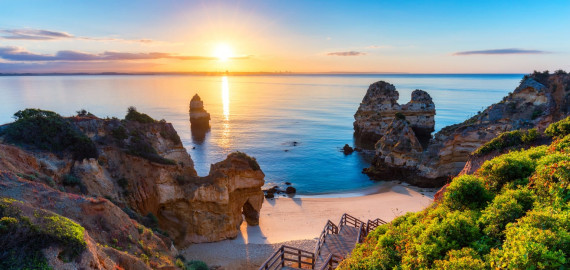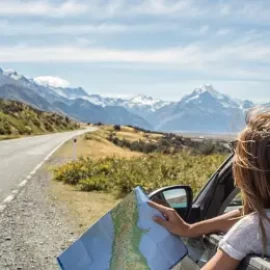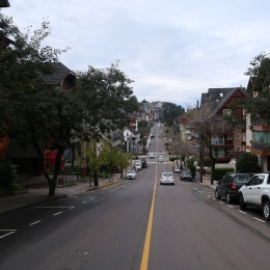"Once upon a time, in the sun-kissed land of Portugal, there existed a quaint village nestled amidst rolling hills and vineyards."
How amazing would it be if your Portuguese travel tale started like this?
Portugal is charming because it combines culture, history, scenic beauty, and kind people. Whether you explore its energetic towns, indulge in its delectable cuisine, or immerse yourself in its rich past, Portugal provides travellers an unforgettable experience. Portugal's stunning scenery can be thoroughly enjoyed by car.
One of the finest ways to see Portugal is on a road trip, where you may travel to rural locations you might not otherwise see.
Portugal, despite its modest size, has an abundance of breathtaking coastal and mountainous scenery, picture-perfect towns, and charming villages hidden away that appear to have escaped the passage of time.
In 2023, Lisbon emerged as the most famous Portuguese destination among foreign tourists, hosting 5.4 million overnight guests.
The most excellent and most convenient method to see everything Portugal has to offer is by renting a car. You can make the most of your time in Portugal with a rental car, from exploring the interior to driving the breathtaking coastline and seeing gorgeous cities like Porto and Lisbon.
Are you set to go off on your road trip through Portugal? Rent a car now to explore the picturesque towns and breathtaking scenery easily.
Table of Contents
Is it wise to rent a car in Portugal?
That depends on your vacation itinerary and the locations you choose to see in Portugal.
Lisbon, Porto, and other essential cities are easily accessible by bus or rail. You won't need a rental car if you want to visit these cities because public transportation in Portugal is well-connected.
But if you have a car, it's easier to explore the beaches in Alentejo, the historic villages of Central Portugal, and even numerous locations in the Algarve.
Some little communities are well worth exploring but are inaccessible by public transit.
In Portugal, Whom to Rent With
There are no icky surprises or hidden fees because it is simple to use, has more than 500 agencies (not only the expensive foreign ones), and is transparent about all charges.
Additionally, you can see each person's agency ratings, allowing you to steer clear of any business with less-than-ideal feedback.
Additionally, they provide a liberal cancellation policy, so you can book in advance to secure a favourable price and make changes or cancellations if necessary.
Tips on Rent A Car In Portugal
Portugal is a straightforward place to rent a car. You will be fine if you have the required paperwork.
These are the most crucial things to be aware of, though, because we want to ensure you have the easiest time possible.
1. Obtain Auto Insurance
The fundamental CDW (Collision Damage Waiver) policy is included with every rental automobile. But there's generally a large deductible associated with this.
You can add on insurance to cover the excess on the car, guard against theft, and cover damage to the wheels, windows, and mirrors, as well as any costs incurred in the event of a breakdown or loss of keys.
Although complete protection is not required, you should consider getting it. Paying a small additional amount for peace of mind is far simpler than taking a chance on a large deductible or covering any costs, such as towing or key replacement.
2. Assemble the Required Paperwork
Although it may seem apparent, make sure you have all the paperwork required before your trip to hire a car in Portugal.
A driver's licence and a passport are required for everyone to rent an automobile.
You'll also require a credit or debit card. While some local rental firms may take debit cards, most will demand a credit card. Check ahead and confirm which kind of payment you'll need.
Documents Needed
When you pick up your rental automobile, you must have the following necessary paperwork with you:
- Before picking up your rental car and embarking on your journey, make sure you have a current driver's licence from your home nation. An International Driving Permit is required by certain employers (IDP). To find out more about the rental company's precise needs, don't hesitate to get in touch with them.
- For the rental deposit and payment, you will require a credit card under the name of the previous driver.
- Genuine evidence of insurance. If your policy does not protect you while driving in Portugal, you need insurance from the automobile rental company.
- In Portugal, the legal age to drive is eighteen. While renting a car often requires a minimum age of 21, other firms may have age requirements of at least 23 or 25 years old.
3. Make the Correct Car Choice
When renting a car in Portugal, the type of gearbox is the first thing you must look at.
Cars with manual gearboxes are the most widely used and reasonably priced choice.
To make your life easier, you should pay more for an automatic gearbox if you're not used to driving one.
You'll probably find yourself driving uphill and through tiny streets rather frequently if you intend to spend any time driving in the cities.
Driving in steep areas like Lisbon and Porto can be less stressful if your automobile has an automatic gearbox.
Second, choose the appropriate car size. A little car is almost always a superior choice—something that may come as a surprise to readers.
You don't need a large automobile if you have enough room for every passenger and your belongings.
Driving in Portuguese towns and locating parking will be much simpler with a smaller vehicle!
4. Always Have Cash on Hhand
It's wise to always carry cash with you, whether it's for parking, petrol or tolls.
Most petrol stations accept credit or debit cards, but occasionally, some may only take Portuguese cards or have card payments disabled.
You are unable to fill your rental car while travelling is the last thing you want to happen to you!
5. Use Appropriate Navigational Aids
Directions throughout Portugal can typically be found accurately using Google Maps and other navigation apps.
However, issues may occur if the route passes through a service-free area and then tries to reroute but needs more available data.
Even worse, the maps need to be updated.
Having an offline map, you can utilise even when there is no service is one method to prevent getting lost when driving in Portugal.
Keeping a backup paper map on hand that you may refer to in case of an emergency, such as a dead phone battery, is another method.
Finally, remember to read traffic signs constantly. Roads may change due to continuous construction or other factors, particularly in cities.
Whenever possible, heed traffic signs rather than depending on your GPS.
6. Limits on Speed
Portugal has speed limits that are comparable to those of much of Europe. The following are the usual speed restrictions; however, be sure to verify them when you visit:
- In cities: 50 km/h
- Regional highways: depending on the signs, 90 or 100 km/h
- Motorways: 50 mph minimum and 120 mph maximum
- Drivers with less than a year's licence can go up to 90 km/h or any slower speed limit on a particular road.
7. Alcohol Limits
In Portugal, the legal limit for blood alcohol content in drivers is 0.5 grammes per litre of blood (0.5 g/l). Although the acceptable amount can vary depending on individual circumstances such as weight and gender, generally speaking, even one drink may exceed the limit. These are the consequences:
- 0.5 to 0.8 g/l: There are fines between €250 and €1250.
- 0.8 g/l to 1.2 g/l: You run the risk of losing your Portuguese driver's licence for up to two years, along with fines that range from €500 to €2500.
- Over 1.2 g/l: This is considered illegal and has a maximum one-year jail sentence.
Average rates to rent a car in Lisbon, Portugal
The most recent prices must be confirmed with current sources or particular rental companies.
-
Economy automobiles:
Whether travelling alone or with a partner, these small automobiles are perfect. Usually, rentals cost between €20 and €40 per day.
-
Standard Cars:
You should budget between €30 and €60 per day if you require additional room for family or friends.
-
Luxury Vehicles:
If you want a more upscale experience, you can rent a luxury vehicle for between €80 and €150 per day.
-
SUVs and Minivans:
These cars, which range in price from about €60 to €120 per day, are a good choice for larger groups or people planning outdoor adventures.
Take advantage of the chance to personalise your Portuguese travel experience. Get your rental car now and embark on a journey that will never be forgotten.
Travel to Lisbon, Portugal, Using Qh Rent A Car
One trustworthy company to consider while hiring a car in Portugal is QH Rent A Car. With a reputation for exceptional service and a wide selection of vehicles, QH Rent A Car offers hassle-free road trip experiences.
They have friendly and knowledgeable staff to assist you at each stage of the rental procedure, ensuring a flawless transaction.
Wrap up
A road trip is the ideal way to take in Portugal's stunning scenery, charming villages, and gorgeous coastline. Understanding the requirements for renting a car in Portugal, especially at Lisbon Airport, will guarantee a smooth and enjoyable journey.
Make reservations for your vehicle in advance and familiarise yourself with the rental procedure, including Lisbon Airport's restrictions regarding vehicle returns.
FAQs:
Does Portugal Have A Speed Limit?
In Portugal, speed limits do exist. In cities, it's usually 50 km/h. It is 90 km/h on major roads and 120 km/h on highways. Look for local signage at all times.
Does Portugal Allow Tourists to Drive?
Of course! Visitors who meet the minimum age requirement of 18 and possess a valid driver's licence from their home country are permitted to drive in Portugal.
Is Driving Safe in Portugal?
Yes, driving is usually safe in Portugal. Most European countries have similar traffic laws, and the nation boasts a well-maintained road network.




 ENG
ENG
 POR
POR







